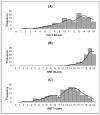Performance on a 1-week delayed recall task is associated with medial temporal lobe structures in neurologically normal older adults
- PMID: 28856963
- PMCID: PMC5832581
- DOI: 10.1080/13854046.2017.1370134
Performance on a 1-week delayed recall task is associated with medial temporal lobe structures in neurologically normal older adults
Abstract
Objective: Traditional episodic memory tests employ a delayed recall length ranging from 10 to 30 min. The neurobiological process of memory consolidation extends well beyond these time intervals, however, raising the possibility that these tests might not be fully sensitive to the subtle neurocognitive changes found in early disease or age-related decline. We aimed to determine the sensitivity of a 1-week delayed recall paradigm to medial temporal lobe (MTL) structure among neurologically normal older adults.
Methods: One hundred and forty functionally intact, older adults (mean age = 75.8) completed a story recall test in which participants learned to 90% criterion. Recall was tested after 30-min and 1-week. Participants also completed a standardized list learning task with a 20-min delay (n = 129) and a structural brain MRI. The MTL, including the parahippocampal gyrus, hippocampus, and entorhinal, was our primary region of interest.
Results: Controlling for age, education, gender and total intracranial volume, the standard 20- and 30-min recalls showed no significant relationship with MTL. In contrast, 1-week recall was uniquely associated with MTL structure (partial r = .24, p = .006), specifically entorhinal (partial r = .27; p = .001) and hippocampal (partial r = .21, p = .02) volumes.
Conclusion: Memory paradigms that utilize 1-week delays are more sensitive than standard paradigms to MTL volumes in neurologically normal older adults. Longer delay periods may improve detection of memory consolidation abilities associated with age-related, and potentially pathological, neurobehavioral change.
Keywords: Aging; Alzheimer’s disease; entorhinal cortex; hippocampus; memory consolidation.
Figures


References
-
- Albert MS, DeKosky ST, Dickson D, Dubois B, Feldman HH, Fox NC, Petersen RC, et al. The diagnosis of mild cognitive impairment due to Alzheimer’s disease: Recommendations from the National Institute on Aging-Alzheimer’s Association workgroups on diagnostic guidelines for Alzheimer’s disease. Alzheimers Dement. 2011;7:270–279. doi: 10.1016/j.jalz.2011.03.008. - DOI - PMC - PubMed
-
- Ashburner J, Ridgway GR. Symmetric diffeomorphic modeling of longitudinal structural MRI. Frontiers in Neuroscience. 2013 https://doi.org/10.3389/fnins.2012.00197. - DOI - PMC - PubMed
-
- Braak H, Alafuzoff I, Arzberger T, Kretzschmar H, Tredici K. Staging of Alzheimer disease-associated neurofibrillary pathology using paraffin sections and immunocytochemistry. Acta Neuropathologica. 2006 https://doi.org/10.1007/s00401-006-0127-z. - DOI - PMC - PubMed
Publication types
MeSH terms
Grants and funding
LinkOut - more resources
Full Text Sources
Other Literature Sources
